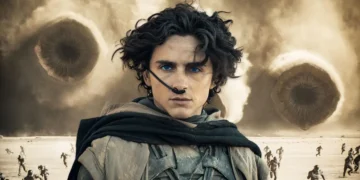Don’t Let the Tennis Fool You—This Is Psychological Warfare
If you went into Challengers expecting a glamorous sports romance, you’re in for a surprise. Directed by Luca Guadagnino (Call Me by Your Name, Suspiria), the film takes place within the high-stakes world of professional tennis—but its real game is emotional dominance.
Zendaya stars as Tashi Duncan, a former tennis prodigy whose injury forces her off the court and into the role of coach. But Tashi isn’t just teaching strokes and strategy—she’s orchestrating the lives of two men who are caught in her gravitational pull: her husband Art (Mike Faist) and his former best friend—and her ex-boyfriend—Patrick (Josh O’Connor).
What unfolds is a tense, sensual, and ultimately twisted power play that spans over a decade.
Told in Reverse—For a Reason
The film’s structure jumps back and forth in time, unraveling years of emotional and sexual tension between the three leads. Guadagnino doesn’t do this for style—it’s essential.
By starting at the peak of conflict and slowly rewinding through history, Challengers shows how control and resentment are planted early—and how love, lust, and competition blur into something toxic.
Every scene becomes layered with irony. What looks like affection in one scene feels like manipulation in another.
Zendaya Delivers Her Most Complex Performance Yet
Zendaya dominates the screen—not just with her presence, but with her control. Tashi is confident, charismatic, and calculating. She manipulates not only the men in her life, but the audience, drawing sympathy one moment and suspicion the next.
Unlike traditional femme fatales, Tashi isn’t motivated by greed or cruelty. She’s motivated by victory. Every moment, every kiss, every tactic is part of a long-term strategy to shape the outcome she wants—on and off the court.
It’s a brilliant performance that blends vulnerability with weaponized charm.
Tennis as a Metaphor for Intimacy and Rivalry
The tennis matches in Challengers aren’t just action set pieces—they’re metaphors. Guadagnino shoots them like duels. Rallies become arguments. Serves become provocations. Every grunt, glance, and sweat-drenched moment is loaded with tension.
By the time we get to the climactic match between Art and Patrick—with Tashi in the middle as both coach and ex-lover—it’s clear that this isn’t just about the game. It’s about revenge, unresolved passion, and a desperate need for approval.
The Sex Scene That Everyone’s Talking About
Without spoiling it, there’s a now-viral three-person scene that redefines how intimacy and tension are portrayed on screen. It’s not explicit in the traditional sense—it’s about gaze, posture, and unspoken intent.
Guadagnino masterfully balances eroticism with discomfort, making viewers question: Who is really in control here?
It’s one of the boldest scenes of the year—and one of the most talked about for good reason.
A Commentary on Performance, Public Image, and Ownership
Beneath all the sexual tension and athleticism, Challengers asks hard questions:
- Who gets to control the narrative in a relationship?
- Can success be shared—or must it be taken?
- Is love real if it’s used as a tactic?
As each character fights for relevance and recognition, it becomes clear that tennis is just the arena. The real battle is for emotional domination.
Final Thoughts
Challengers is stylish, sharp, and seductive—but beneath the surface, it’s a psychological pressure cooker. It’s a rare sports drama that isn’t about winning the match, but about surviving the fallout of people who’ve turned love into a weapon.
If you’re looking for a movie that’s just about tennis, look elsewhere. But if you want a film that leaves you unnerved, aroused, and slightly disturbed—Challengers delivers.
Rating: ★★★★½ (4.5/5)
A sweaty, cerebral drama where love is just another game—and only one can win.





















